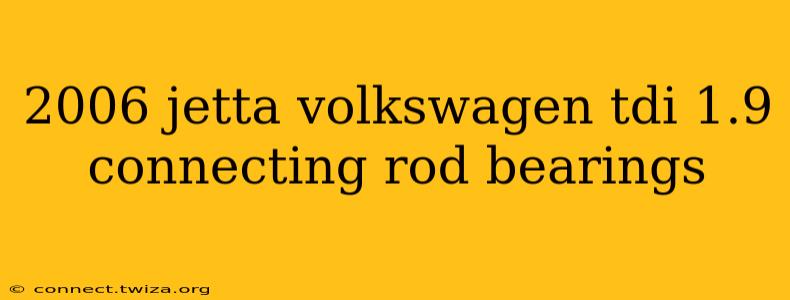The 1.9-liter TDI engine in the 2006 Volkswagen Jetta, while renowned for its fuel efficiency and torque, isn't without its potential pitfalls. One significant concern for owners is connecting rod bearing failure. This article delves into the causes, symptoms, and solutions surrounding this issue, providing valuable information for both Jetta owners and mechanics.
What are Connecting Rod Bearings and Why Do They Fail?
Connecting rod bearings are crucial components in any internal combustion engine. These small but vital parts sit between the connecting rod and the crankshaft, facilitating the transfer of power from the pistons to the wheels. They endure immense pressure and friction, constantly rotating and absorbing the forces generated during combustion.
Failure typically occurs due to several factors:
- Insufficient lubrication: Lack of proper oil pressure, caused by low oil levels, a faulty oil pump, or clogged oil passages, deprives the bearings of the necessary lubrication, leading to overheating and eventual failure.
- Low-quality oil: Using oil that doesn't meet the manufacturer's specifications can lead to premature wear and tear on the bearings. The wrong viscosity or inadequate additive packages can drastically reduce bearing lifespan.
- Contaminants in the oil: Debris, such as metal shavings from other engine components or dirt, can contaminate the oil and accelerate bearing wear.
- Engine wear: Over time, general engine wear can contribute to increased stress on the bearings, increasing the risk of failure.
- High mileage: As vehicles age and accumulate miles, the bearings naturally wear down. This process is accelerated by the factors listed above.
What are the Symptoms of Failing Connecting Rod Bearings?
Recognizing the symptoms of failing connecting rod bearings early is crucial to prevent catastrophic engine damage. Be vigilant for:
- Knocking or tapping noise: This is often the first noticeable symptom, a distinct metallic sound that intensifies with engine speed. It's frequently described as a "rod knock."
- Low oil pressure: The oil pressure gauge might indicate low pressure, or the warning light might illuminate. This is a critical sign requiring immediate attention.
- Loss of engine power: The engine may lose power or become sluggish.
- Oil leaks: Oil might leak from the engine due to bearing damage causing seal failure.
- Unusual engine vibrations: The engine might vibrate excessively, particularly at certain RPMs.
How Much Does it Cost to Replace Connecting Rod Bearings on a 2006 Jetta 1.9 TDI?
The cost to replace connecting rod bearings on a 2006 Jetta 1.9 TDI varies depending on several factors including labor rates, the extent of the damage, and the need for additional repairs (often other related engine components are affected). Expect to pay anywhere from several hundred dollars for a relatively straightforward repair to several thousand dollars if significant additional damage has occurred. It's essential to get a thorough diagnosis from a qualified mechanic before embarking on any repairs.
Can I Repair Connecting Rod Bearings Myself?
While some mechanically inclined individuals might attempt this repair, it’s strongly discouraged for those without extensive engine rebuild experience. Replacing connecting rod bearings requires precision, specialized tools, and a thorough understanding of engine mechanics. Incorrect installation can lead to further engine damage, resulting in far higher repair costs. This repair is best left to qualified professionals with access to the proper equipment and expertise.
How Can I Prevent Connecting Rod Bearing Failure?
Preventive maintenance is key to extending the life of your 2006 Jetta 1.9 TDI's connecting rod bearings. This includes:
- Regular oil changes: Using high-quality oil that meets VW's specifications and adhering to the recommended oil change intervals is paramount.
- Monitoring oil pressure: Regularly check your oil level and pressure. Pay close attention to any unusual indicators.
- Addressing leaks promptly: Fix any oil leaks immediately to maintain proper oil pressure.
By understanding the potential causes, recognizing the symptoms, and practicing proactive maintenance, you can significantly reduce the risk of connecting rod bearing failure in your 2006 Volkswagen Jetta 1.9 TDI. Remember that timely intervention is crucial to prevent catastrophic engine damage and expensive repairs.
